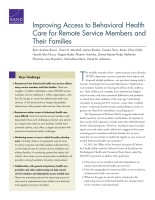| 来源类型 | Research Reports
|
| 规范类型 | 报告
|
| ISBN | 9780833087294
|
| 来源ID | RR-578/1-OSD
|
| Improving Access to Behavioral Health Care for Remote Service Members and Their Families |
| Ryan Andrew Brown; Grant N. Marshall; Joshua Breslau; Coreen Farris; Karen Chan Osilla; Harold Alan Pincus; Teague Ruder; Phoenix Voorhies; Dionne Barnes-Proby; Katherine Pfrommer; et al.
|
| 发表日期 | 2015
|
| 出版年 | 2015
|
| 页码 | 12
|
| 语种 | 英语
|
| 结论 |
More Than 1.3 Million Service Members and Dependents Are Geographically Remote for Behavioral Health Care- Roughly 1.3 million individuals (some 300,000 service members and an additional 1 million dependents) were at risk of living in an area remote from behavioral health care.
- Remoteness is not a static property but a risk that any service member or dependent could encounter over time.
- Active component service members are more likely to be remote if they are older, higher ranking, more educated, and married; this pattern was not found for the National Guard/Reserves.
Remoteness Reduces Use of Behavioral Health Care- Remote active component service members made fewer visits to any specialty behavioral care provider and made fewer psychotherapy visits than non-remote service members.
- There is some evidence of a substitution of non-specialist care for specialist care in the active component.
No Monitoring of Existing Policies and Programs Exists, but Some Promising Solutions Do- Department of Defense maintains guidelines for access to care but there is no evidence of monitoring adherence to those guidelines.
- Two promising pathways for improving access to care among remote military populations are telehealth and collaborative care that integrates primary care with specialty behavioral care.
|
| 摘要 |
- DoD should establish clear policies for enhancing access to behavioral health care among remote service members and their dependents, setting an official standard of a maximum 30-minute drive to behavioral health specialty care, working quickly on closing the gap for active component service members, and setting goals of concerted progress toward increasing access for National Guard/Reserve service members and dependents.
- The department should monitor implementation of these policies by establishing the computing infrastructure and data visualization capabilities to support an interactive data portal to monitor access to care for service members and dependents; making this monitoring system part of a larger effort to develop, test, and assess alternative methods of delivery for behavioral health care in remote settings; and requiring regional managed-care contractors to share their provider database with DoD and to regularly update this database and provide all required data fields, to the best of their ability.
- Establish a special focus that strives toward improvement of remote behavioral health care by continuing to innovate and collect systemwide evidence on the effectiveness of telemental health and collaborative care treatment in military populations, removing outdated technical and regulatory barriers to telemental health and collaborative care approaches to behavioral health within the Military Health System, and feeding data and evidence into monitoring systems in order to systematically improve both access to and quality of care.
|
| 主题 | Health Information Technology
; Mental Health and Illness
; Military Families
; Military Health and Health Care
; Substance Abuse
|
| URL | https://www.rand.org/pubs/research_reports/RR578z1.html
|
| 来源智库 | RAND Corporation (United States)
|
| 资源类型 | 智库出版物
|
| 条目标识符 | http://119.78.100.153/handle/2XGU8XDN/108111
|
推荐引用方式
GB/T 7714 |
Ryan Andrew Brown,Grant N. Marshall,Joshua Breslau,et al. Improving Access to Behavioral Health Care for Remote Service Members and Their Families. 2015.
|
|
文件名:
|
x1495316363856.jpg
|
|
格式:
|
JPEG
|

|
文件名:
|
RAND_RR578z1.pdf
|
|
格式:
|
Adobe PDF
|
除非特别说明,本系统中所有内容都受版权保护,并保留所有权利。